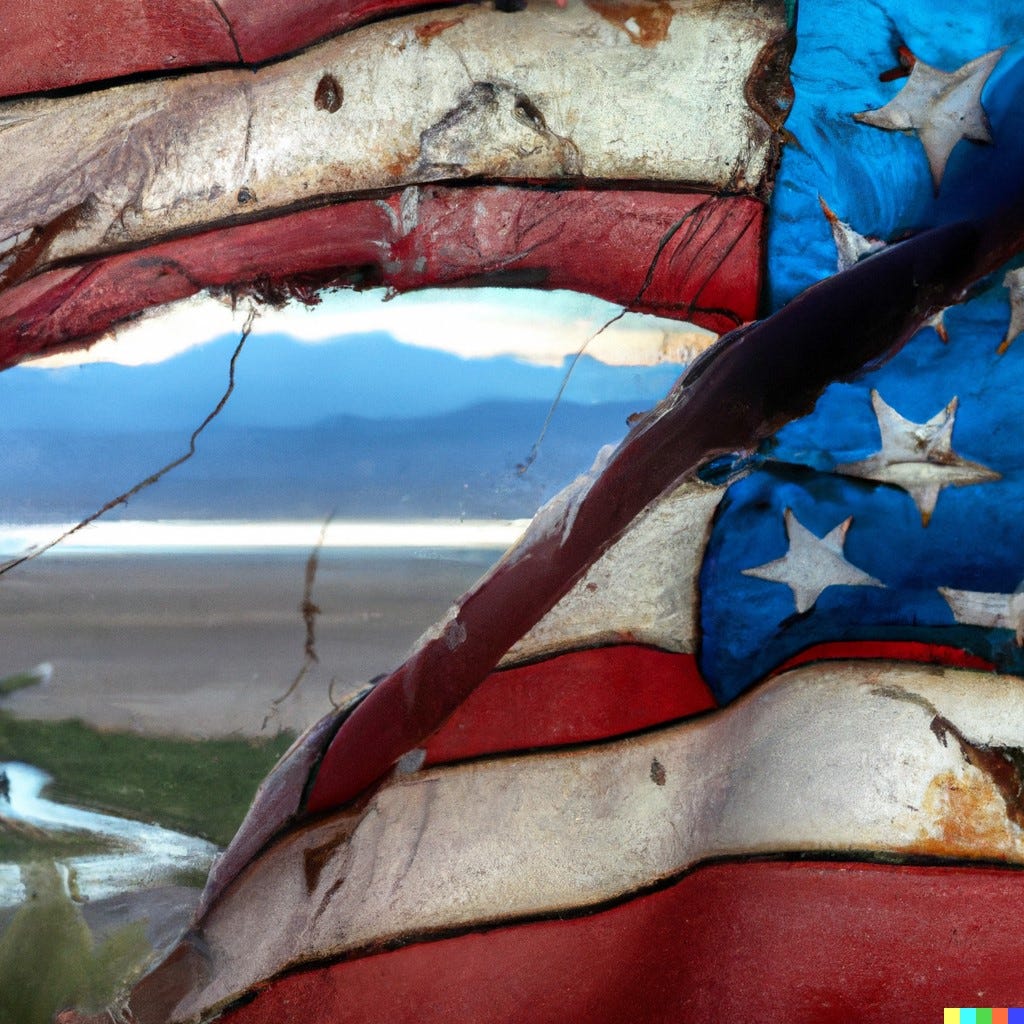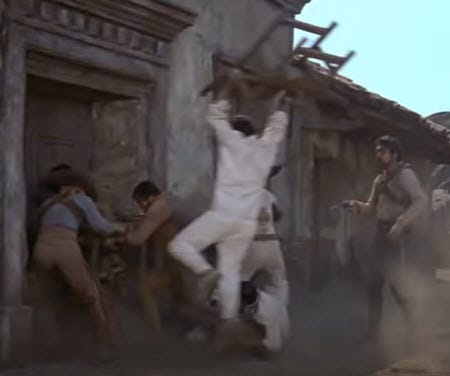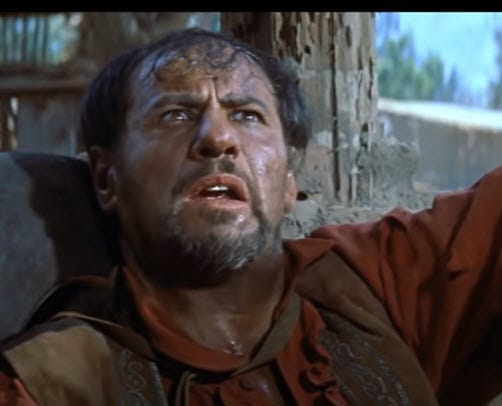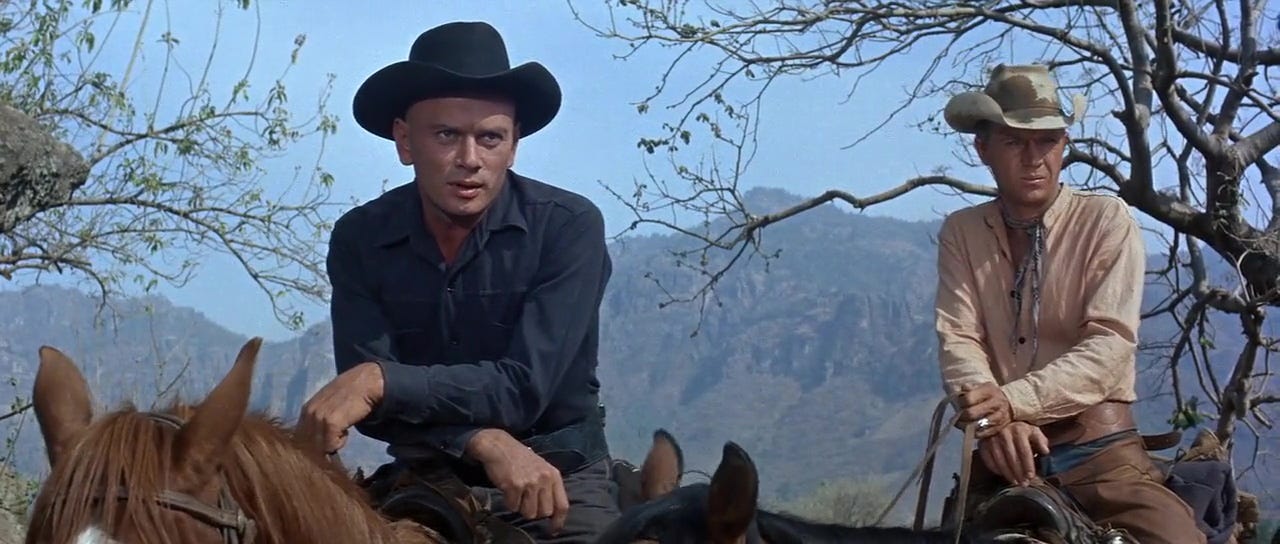Re-posting with some additions on the eve of a dark July 4.
America has always been an idea as much as it’s been a place, and I know we don’t all hold the same idea about what it should be. That becomes more and more evident to me every day. What follows are some thoughts on the ideas I grew up with and still hold onto, and the Culture Things that communicated them to me in my youth.
I’ve been thinking about the things I carry.
I’m not a pack-rat or a hoarder, but there are ideas and pieces of culture that I hold close and seem not to want to part with, even when the larger culture announces that they’ve have hit their sell-by date and should be discarded. How I think about my country (what it is and what it should be) seems to be one of those things.
My feelings are probably not progressive enough or conservative enough for other people’s tastes, neither sufficiently patriotic nor sufficiently critical. But whatever those feelings are, they’re mine. And I’ve been thinking about where they came from.
As a card-carrying member of Generation Jones, I’ve always had a complicated relationship with patriotism. My parents were Depression babies and Eisenhower teens, coming into their own during the post-war, American-Century boom and settling down to raise children while Vietnam raged oversees and the Woodstock era exploded at home. Whatever they thought and felt about their country was never spoken out loud when I was a child, but it was certainly part of the air I breathed, in the same way that their Breakfast at Tiffany’s New York would never be mine to live in, but was always mine to dream about. I inherited their world, even as it was disappearing or changing.
Other than seeing hippies on the streets during our summer vacations, I was a pretty oblivious child. I did watch the Watergate hearings with my parents and I did understand, at least in general terms, that Something Was Terribly Wrong. In middle and high school, I paid only occasional attention to politics, looking backward at the 1960s more than I looked around at my 1970s, caring more about Monty Python and The Beatles than about our presidents. I got my current events news from Doonesbury comic strips. I was a casually liberal, suburban, New Yorker in the making. Doonesbury taught me, but so did movies like In the Heat of the Night and To Kill a Mockingbird and Inherit the Wind. I knew what boxes to check: Vietnam, bad; Watergate, bad; Nixon, bad; Reagan, bad. FDR, JFK, MLK? Good. Freedom of Speech? Excellent. The presidents up on Mount Rushmore? Classics. The American Dream? All for it.
As I moved into my college years during the Reagan Administration, the Boomers ahead of me moved into their thirties and beyond, many of them transforming into “Greed is Good” Yuppies. At every stage of life, they had defined the larger culture, and in this moment, the culture was all Big Chill: solipsistic nostalgia, curdled idealism, and early-middle-aged excuse-making. All that cool and groovy peace and love stuff of their younger years—all the anti-war passion that I had relished—was it all just…nothing? If they, who had seemed to care so much, no longer believed in anything except themselves, what were we, their more sarcastic, younger siblings, supposed to believe?
And yet, the idealism never quite curdled in me. That base-layer of Eisenhower-y boosterism, or old Hollywood idealism, or middle-class, Jewish striving, all of that stayed with me, colored and enriched and informed by movies and music and books I had surrounded myself with as a child.
It was definitely a weird grab-bag of culture: Classical music, Broadway show tunes, Dixieland Jazz, Rock & Roll, and protest folk music; the film noir and WWII movies that I watched at home with my father, and the zonked-out, counter-culture films that I watched with my friends at our local art-house theater; James Thurber, but also Kurt Vonnegut; Hemingway and Fitzgerald, but also Hunter S. Thompson. I knew some of the art had been created to challenge and cancel what had come before it, but none of it did so in my mind. There was room for all of it, and all of it, together, told me who we were: My Country, ‘Tis of Thee, but also, Feel Like I’m Fixin’ to Die Rag.
We were allegedly a cynical and self-centered mini-generation—the wedge that led to Generation X—and yet, when we, as young, married couples in New York City, stood in stunned, silent shock after 9/11, we reached back to the patriotic songs we had learned in our childhood. We stood on the stoops of our Brooklyn brownstones, holding candles aloft at sunset to honor our fallen firefighters, and we sang those corny old songs, like It’s a Grand Old Flag, and, yes, My Country, ‘Tis of Thee. Because that’s what those songs were for; that’s why they had been taught to us, even in the midst of political and cultural upheaval—so that we could have them when we needed them. And on that day, when we needed them, we didn’t sing them mindlessly, or with uncomplicated feelings. But we sang them.
That was a whole generation ago (which blows my mind). What songs do the new, young marrieds in Brooklyn have stored away in their memories, to bring out when the storm clouds gather and the skies grow dark? What cultural artifacts have they put in their mental libraries to form a sense of home and country, when both are threatened? Do they have what they’ll need to bind them together and keep them warm in the cold days—something heartfelt and hopeful? Or is it all just criticism and cynicism? I don’t know. Maybe it’s naïve and old-fashioned even to ask the question.
When I think about the bits of art and music and poetry that formed my sense of self and country, I wonder if any of it still means anything, or if it’s all just Eliot’s “heap of broken images,” leaving me, in late middle-age, with nothing but fear and a handful of dust. Is it all outdated, outmoded, and dead? Or are some of those fragments still vibrant and meaningful? If they’ve lost their kinetic energy, do they still have any potential locked inside? Could they be seeds holding something good—seemingly inert, but filled with the essence of life and able, if nurtured, to grow and flower again?
I don’t know. Maybe they’re just shards of useless, colored glass, or broken Hummel figurines of the kind that our grandparents used to collect—old and musty and a little embarrassing, best swept up and thrown away. I suspect that’s exactly what they are to most people in my children’s generation. And that makes me sad, because there were things in that heap that I valued.
I guess it’s not up to me to say what any of it will be worth. I’m a Hummel figurine, myself, or rapidly becoming one. The future will take what it needs and discard what it doesn’t need, as it always does.
Either way, here are a few shards from the world I inherited and grew up in—some of the bits and pieces that told me who we were, or wanted to be, or could be. It’s not a complete list, and it doesn’t paint a complete picture. It’s just some stuff from the attic that I’m airing out. Make of it what you will.
Henry David Thoreau
Because he thought new and uniquely American thoughts, and he said things like:
I think that we should be men first, and subjects afterward.
Still seems kind of relevant, doesn’t it?
And also:
I went to the woods because I wished to live deliberately, to front only the essential facts of life, and see if I could not learn what it had to teach, and not, when I came to die, discover that I had not lived.
I know—his “woods” were barely a day’s walk out of town. But at least he tried—at least he understood that to do something new, or at least think something new, you needed as much of a tabula rasa as you could manage for yourself.
And maybe this wasn’t new, but it mattered: we were not born simply to endure lives of quiet desperation.
Ralph Waldo Emerson
Because he taught us to rely on ourselves, not the dead hand of history; He reminded us that a foolish consistency and conformity are death.
Nothing is at last sacred but the integrity of your own mind.
What I must do is all that concerns me, not what the people think.
I once gave a big, bruising, anti-racist-skinhead student the essay, “Self Reliance” to read, and he told me that it spoke to him so much that he took it home and quoted portions to his mother, who finally understood her son and knew how to be his ally. Don’t tell me that our kids can’t read and shouldn’t read our foundational texts. How are they supposed to have a foundation if they don’t?
Pete Seeger
I listened to him as a child because my mother loved him. I’m not sure I understood that they weren’t children’s songs, even though some of them were about children. They are tough songs—call-to-action songs—but they are always bright and positive and forward-facing songs that believe in a better world...if we’re willing to make it.
Alice’s Restaurant
Because it took place where I spent my summers, and I was there, oblivious but somewhere down the road while it was all happening. And because, when I finally came to read Thoreau and Emerson, I understood that what Arlo and his friends were doing was not unique or threatening; it was their cultural heritage, whether their elders understood it or not.
Langston Hughes
Because he understood what this country was, at its absolute worst, and he insisted that it live up to what it could be, at its best.
O, let America be America again—
The land that never has been yet—
And yet must be—the land where every man is free.
The land that’s mine—the poor man’s, Indian’s, Negro’s, ME—
Who made America,
Whose sweat and blood, whose faith and pain,
Whose hand at the foundry, whose plow in the rain,
Must bring back our mighty dream again.
No additional comment necessary.
Rhapsody in Blue
Because it’s a gorgeous collision of classical music and jazz and Jewish klezmer music and New York traffic noises, and I can’t imagine what it must have been like to sit in an audience and hear it for the very first time, in that 1920s generation that was inventing and hearing truly new, completely American music.
Appalachian Spring
I’m a Yankee by birth and by temperament, and this music feels like old home music—old America made new; simple gifts made grand. It stirs me and gives me peace, both.
Annie Dillard
Because when I first read her, I said, “Oh—it’s Thoreau again.” And because, like him, she found a way to marry quiet contemplation of the wild world with an urgency not to live a life of resignation.
I would like to learn, or remember, how to live. I come to Hollins Pond not so much to learn how to live as, frankly, to forget about it. That is, I don't think I can learn from a wild animal how to live in particular--shall I suck warm blood, hold my tail high, walk with my footprints precisely over the prints of my hands?--but I might learn something of mindlessness, something of the purity of living in the physical sense and the dignity of living without bias or motive. The weasel lives in necessity and we live in choice, hating necessity and dying at the last ignobly in its talons. I would like to live as I should, as the weasel lives as he should. And I suspect that for me the way is like the weasel's: open to time and death painlessly, noticing everything, remembering nothing, choosing the given with a fierce and pointed will.
The Magnificent Seven
Of all the many Westerns, this one—because it is one of my father’s treasured possessions, and because of these three moments in particular:
Some of my earliest lessons on bullying and cowardice came from this movie, and what it means (and costs) to take a stand for something bigger than yourself.
The Great Gatsby
Because Gatsby is us, and we are him, and we can’t help believing in Daisy’s green light and the “fresh, green breast of the new world.”
Most of the big shore places were closed now and there were hardly any lights except the shadowy, moving glow of a ferryboat across the Sound. And as the moon rose higher the inessential houses began to melt away – until gradually I became aware of the old island here that flowered once for Dutch sailors’ eyes – a fresh, green breast of the new world. Its vanished trees, the trees that had made way for Gatsby’s house, had once pandered in whispers to the last and greatest of all human dreams; for a transitory enchanted moment man must have held his breath in the presence of this continent, compelled into an aesthetic contemplation he neither understood nor desired, face to face for the last time in history with something commensurate to his capacity for wonder.
Is a new world really possible, or do we just keep getting sucked back into old jealousies and hatreds and prejudices, no matter how furiously we try to row our boats forward? How can you be an American and not grapple with that question?
Huckleberry Finn
Because Huck and Jim are together, and that means everything. When they’re on that raft, away from the shore and the hateful, horrible people who inhabit it, they are free. That raft is the hope of what America could be, someday, and it has to keep on the move, always, on that river that cuts through America but isn’t quite part of it—just as Huck has to keep on the move at the end, one step ahead of America, in order to stay free.
But I reckon I got to light out for the territory ahead of the rest, because Aunt Sally she's going to adopt me and sivilize me, and I can't stand it. I been there before.
Is that a downer ending? Maybe. If Huck lives a reasonably long life, America will catch up with him, sooner or later, no matter how far he runs. But that’s why we have…
On the Road
Because Huck and Jim are still on the move, even in our day. And even after all of the drama and sadness and craziness, we don’t accept a world-weary shrug and a sigh of hopelessness at the end:
What is that feeling when you're driving away from people and they recede on the plain till you see their specks dispersing? It's the too-huge world vaulting us, and it's good-bye. But we lean forward to the next crazy venture beneath the skies.
Is it a sucker’s game to keep leaning forward when you feel the darkness encroaching? Is there really anything better up ahead, or is it just more of the same?
I don’t know.
I know less and less, these days. But I remember that Brecht looked at his world in 1939—a world that made him pack up his family and flee for his life—and he wrote: “In the dark times, will there also be singing?” And then he answered himself: “Yes, there will also be singing—about the dark times.”
Casablanca
This movie—always. Because it sings about the dark times. Explicitly, when Victor leads the band in, “Le Marseillaise” in a room full of Nazis. And less explicitly all the way through, to the ending—the ending that nobody was sure about until they filmed it.
This movie, because sometimes, even if it feels foolish or risky, you have to stick your neck out for other people. And when you do it, you’ll find out you’re not alone.
Walt Whitman
Because, finally, in spite of everything, we are big and weird and crazy—individually and as a nation. We always have been. We are large; we contain multitudes. It is not an impossible request to ask us to reach out and embrace and love each other as family.
His poems are lists upon lists of the people and places and things of America—everything he encounters in his wanderings—and all he wants is to wrap his poetic arms around every bit of it, sounding his barbaric yawp and celebrating his country.
Whitman wanted to invent a new kind of poetry for a new, rougher, more democratic world. He believed in the green light, just like Gatsby did. Just like I did, I guess. Maybe it was an illusion for all of us—a ghost of a light that seemed to beckon us forward but was actually just the dying remnant of something from long ago. I don’t know.
But these shards—these fragments—are still with us. They’re still with me. They nag at me. They won’t go away. And as far as I’m concerned, Whitman’s invitation to make the world new is still pending. He’s still holding out his hand to us.
Failing to fetch me at first keep encouraged,
Missing me one place search another,
I stop somewhere waiting for you.
What answer will we give him, in our time?







